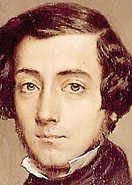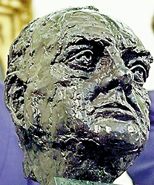Sunday Times 2
Democracy in tea party America
BERKELEY – When the French politician and moral philosopher Alexis de Tocqueville published the first volume of his Democracy in America in 1835, he did so because he thought that France was in big trouble and could learn much from America. So one can only wonder what he would have made of the Republican National Convention in Tampa, Florida.
For Tocqueville, the grab for centralised power by the absolutist Bourbon monarchs, followed by the French Revolution and Napoleon’s Empire, had destroyed the good with the bad in France’s neo-feudal order. Decades later, the new order was still in flux.

Alexis de Tocqueville
In Tocqueville’s imagination, at least, the old order’s subjects had been eager to protect their particular liberties and jealous of their spheres of independence. They understood that they were embedded in a web of obligations, powers, responsibilities, and privileges that was as large as France itself. Among the French of 1835, however, “the doctrine of self-interest” had produced “egotism…no less blind.” Having “destroyed an aristocracy,” the French were “inclined to survey its ruins with complacency.”
To the “sick” France of 1835, Tocqueville counterposed healthy America, where attachment to the idea that people should pursue their self-interest was no less strong, but was different. The difference, he thought, was that Americans understood that they could not flourish unless their neighbours prospered as well. Thus, Americans pursued their self-interest, but in a way that was “rightly understood”.
Tocqueville noted that “Americans are fond of explaining…[how] regard for themselves constantly prompts them to assist each other, and inclines them willingly to sacrifice a portion of their time and property to the general welfare”.
The French, by contrast, faced a future in which “it is difficult to foresee to what pitch of stupid excesses their egotism may lead them,” and “into what disgrace and wretchedness they would plunge themselves, lest they should have to sacrifice something of their own well-being to the prosperity of their fellow-creatures.”
For Tocqueville, France’s sickness in 1835 stemmed from its Bourbon patrimony of a top-down, command-and-control government, whereas America’s health consisted in its bottom-up, grassroots-democratic government. Give the local community enough control over its own affairs, Tocqueville argued, and one “will see at a glance…the close tie which unites private to general interest”. It was “local freedom which leads a great number of citizens to value the affection of their neighbours and of their kindred, perpetually brings men together, and forces them to help one another, in spite of the propensities which sever them”.
Nearly two centuries have passed since Tocqueville wrote his masterpiece. The connection between the general interest and the private interest of individual Americans has, if anything, become much stronger, even if their private interest is tied to a post office box in the Cayman Islands. Indeed, no private-equity fortunes were made over the past generation without investing in or trading with the prosperous North Atlantic industrial core of the world economy.
But the mechanisms that individuals can use to join with their immediate neighbours in political action that makes a difference in their lives have become much weaker. If, say, 25 per cent of the 1,000 households in the 30-block Brookside “fiberhood” in Kansas City, Missouri, pre-subscribe, Google will provide all 1,000 with the opportunity to get very cheap, very fast Internet service very soon. But that is the proverbial exception that proves the rule.
And the Republicans gathered in Tampa to celebrate the rule – to say that the America that Tocqueville saw no longer exists: Americans no longer believe that the wealth of the rich rests on the prosperity of the rest. Rather, the rich owe their wealth solely to their own luck and effort. The rich – and only the rich – “built” what they have.
The willingness to sacrifice some part of their private interest to support the public interest damages the souls and portfolios of the 1 per cent.
Perhaps the moral and intellectual tide will be reversed, and America will remain exceptional for the reasons that Tocqueville identified two centuries ago. Otherwise, Tocqueville would surely say of Americans today what he said of the French then. The main difference is that it has become all too easy “to foresee to what pitch of stupid excesses their egotism may lead them” and “into what disgrace and wretchedness they would plunge themselves.”
J. Bradford DeLong, a former deputy assistant secretary of the US Treasury, is Professor of Economics at the University of California at Berkeley and a research associate at the National Bureau for Economic Research.Copyright: Project Syndicate, 2012. Exclusive to the Sunday Times
Follow @timesonlinelk
comments powered by Disqus




















